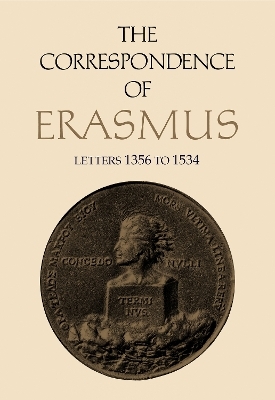
The Correspondence of Erasmus
Letters 1356 to 1534, Volume 10
Seiten
1992
University of Toronto Press (Verlag)
978-0-8020-5976-5 (ISBN)
University of Toronto Press (Verlag)
978-0-8020-5976-5 (ISBN)
- Titel z.Zt. nicht lieferbar
- Versandkostenfrei
- Auch auf Rechnung
- Artikel merken
The period from April 1523 to December 1524 finds Erasmus still in Basel and still preoccupied above all with ‘the sorry business of Luther.‘ He knows that the efforts of his conservative Catholic detractors to prove that he had ‘laid the egg that Luther hatched‘ can be overcome only if he takes an unambiguous public stand against Luther, and friendly princes and prelates constantly urge him to do so. But he dreads the controversy that an attack on Luther will arouse and fears that the overthrow of Luther will entail the defeat of all wholesome reform.
This reluctance to ‘enter the arena‘ against Luther is in large measure overcome by the attacks upon Erasmus by reforming zealots who interpret his reserved attitude towards Luther as secret collusion with the pope, motivated by cowardice and avarice. Starting in the spring of 1523, a ‘conspiracy‘ of Lutheran ‘lunatics,‘ many of them former friends, publishes a series of ‘wild and libellous‘ pamphlets' against Erasmus, of which Ulrich von Hutten's Expostulatio (answered by Erasmus' Spongia) is the first and most important.
In the letters 1523-4, Erasmus' mounting anger at the authors of these attacks goes hand in hand with his slowly formed decision to publish a book against Luther on free will. When De libero arbitrio is published in September 1524, Eramsus describes it less as an attack on Luther, about whom his feelings are still ambivalent, than as a settling of accounts with Luther's ‘subversive, crazy, noisy‘ supporters.
The reaction of Erasmus' Catholic patrons to the De libero arbitrio is gratifying, and the initial response from Wittenberg is muted. Word reaches Eramus that Luther will doubtless reply in a moderate tone. Not until the publication of the De libero arbitrio in December 1525 will Erasmus learn what a scourge Luther's ‘modernation‘ can be.
Volume 10 of the Collected Works of Erasmus series.
This reluctance to ‘enter the arena‘ against Luther is in large measure overcome by the attacks upon Erasmus by reforming zealots who interpret his reserved attitude towards Luther as secret collusion with the pope, motivated by cowardice and avarice. Starting in the spring of 1523, a ‘conspiracy‘ of Lutheran ‘lunatics,‘ many of them former friends, publishes a series of ‘wild and libellous‘ pamphlets' against Erasmus, of which Ulrich von Hutten's Expostulatio (answered by Erasmus' Spongia) is the first and most important.
In the letters 1523-4, Erasmus' mounting anger at the authors of these attacks goes hand in hand with his slowly formed decision to publish a book against Luther on free will. When De libero arbitrio is published in September 1524, Eramsus describes it less as an attack on Luther, about whom his feelings are still ambivalent, than as a settling of accounts with Luther's ‘subversive, crazy, noisy‘ supporters.
The reaction of Erasmus' Catholic patrons to the De libero arbitrio is gratifying, and the initial response from Wittenberg is muted. Word reaches Eramus that Luther will doubtless reply in a moderate tone. Not until the publication of the De libero arbitrio in December 1525 will Erasmus learn what a scourge Luther's ‘modernation‘ can be.
Volume 10 of the Collected Works of Erasmus series.
Desiderius Erasmus (c. 1466–1536), a Dutch humanist, Catholic priest, and scholar, was one of the most influential Renaissance figures. A professor of divinity and Greek, Erasmus wrote, taught, and travelled, meeting with Europe’s foremost scholars. A prolific author, Erasmus wrote on both ecclesiastic and general human interest subjects. Alexander Dalzell is professor emeritus of classics at the University of Toronto (Trinity College). R.A.B. Mynors is Corpus Christi Professor of Latin, Oxford University.
| Erscheint lt. Verlag | 16.4.1992 |
|---|---|
| Reihe/Serie | Collected Works of Erasmus |
| Übersetzer | Alexander Dalzell, R.A.B. Mynors |
| Verlagsort | Toronto |
| Sprache | englisch |
| Maße | 178 x 254 mm |
| Gewicht | 1120 g |
| Themenwelt | Geisteswissenschaften ► Philosophie ► Geschichte der Philosophie |
| Geisteswissenschaften ► Philosophie ► Östliche Philosophie | |
| Geisteswissenschaften ► Philosophie ► Philosophie des Mittelalters | |
| Geisteswissenschaften ► Philosophie ► Philosophie der Neuzeit | |
| Religion / Theologie ► Christentum ► Kirchengeschichte | |
| Geisteswissenschaften ► Sprach- / Literaturwissenschaft ► Anglistik / Amerikanistik | |
| Geisteswissenschaften ► Sprach- / Literaturwissenschaft ► Literaturwissenschaft | |
| ISBN-10 | 0-8020-5976-7 / 0802059767 |
| ISBN-13 | 978-0-8020-5976-5 / 9780802059765 |
| Zustand | Neuware |
| Haben Sie eine Frage zum Produkt? |
Mehr entdecken
aus dem Bereich
aus dem Bereich
von Athanasius bis Gregor dem Großen
Buch | Softcover (2024)
C.H.Beck (Verlag)
CHF 18,90
mein Leben mit Benedikt XVI.
Buch | Hardcover (2023)
Verlag Herder
CHF 39,90


